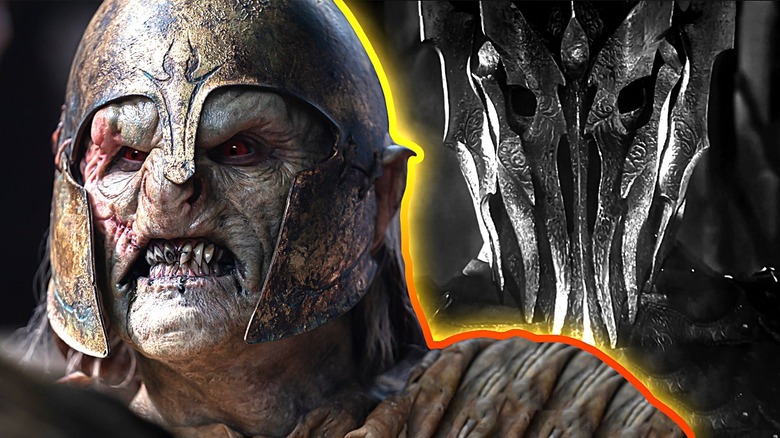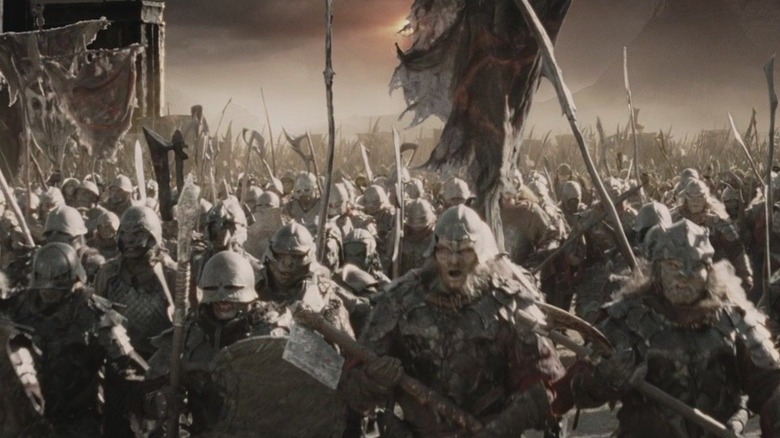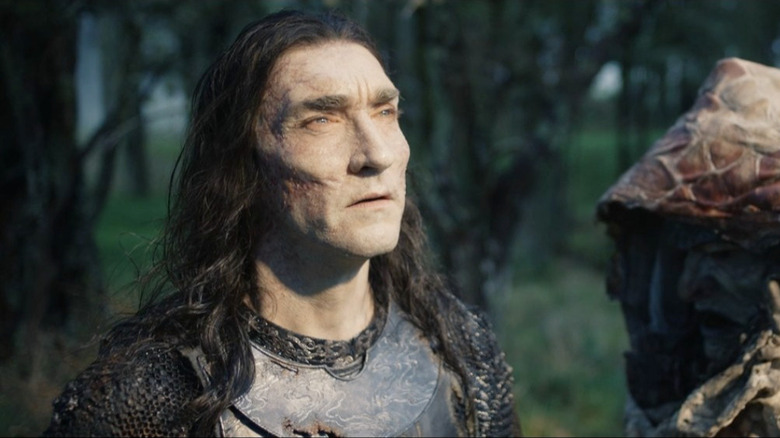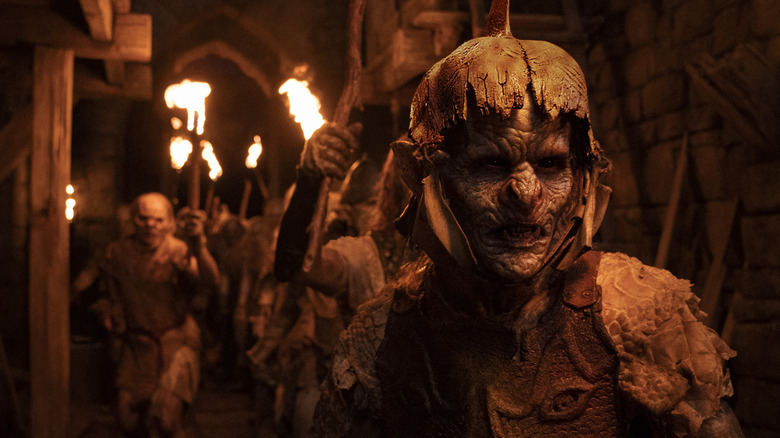Lord Of The Rings: What Happened To The Orcs After Sauron's Death
"The Lord of the Rings" is J.R.R. Tolkien's magnum opus. It is the trilogy for which he's best known. And yet, his world of Middle-earth has a vast and intricate history that starts long before Frodo inherits the Ring and even goes a short distance past its destruction. In those later stages of "The Lord of the Rings," we get quite a bit of happily-ever-after context. We see Aragorn crowned, the Hobbits return home, and the ring-bearers ship off toward the Undying Lands in the West.
Even with the baddies, we get some closure. Saruman and Wormtongue die, while Sauron meets a fate worse than death. But what about his minions? What about the orcs, in particular? Unfortunately, there is no clear answer about what happens to the hordes of canon-fodder servants that populate the Dark Lord's armies. One thing is clear, though. They don't just die or evaporate into thin air when the One Ring is destroyed.
To get a clearer idea of the most likely fate for the Orcs, you need to understand their makeup. Tolkien waffled on what the Orcs in the "Lord of the Rings" are, exactly. At different times, the author thought they were corrupted Elves, soulless animals, and even Men. It's also highly likely that he did think they could be redeemed, which gives them a more unique degree of agency in their own stories. Yet, there just isn't that much out there about what happens to Orcs after the fact. Let's take a look at where Tolkien leaves the Orcs at the end of the Third Age (when the story ends), and whether they ever factor into the Fourth Age that followed.
The end of Orc history (as we know it)
The last obvious thing we get that specifically addresses Orcs is at the Black Gate right after the One Ring is destroyed. In Peter Jackson's film adaptation of "The Return of the King, the land around the Armies of the West conveniently crumbles, consuming all of Sauron's minions and leaving Aragorn and Company with minimal cleanup. The book version isn't quite so clear-cut. It says the Men of Rhûn and Harad either flee or fight to the death. It also says, "the creatures of Sauron, orc or troll or beast spell-enslaved, ran hither and thither mindless; and some slew themselves, or cast themselves in pits, or fled wailing back to hide in holes and dark lightless places far from hope." So, a few clearly survive, but they're masterless and on the lam.
A bit later in the book, it adds the non-specific line that, as king, Aragorn gives the lands around Lake Núrnen in Mordor to a group cryptically called "the slaves of Mordor." In the appendices of the book it also says, "For though Sauron had passed, the hatreds and evils that he bred had not died, and the King of the West had many enemies to subdue before the White Tree could grow in peace." Technically, Orcs could be part of the slaves of Mordor and the evils Sauron had bred, but the reference doesn't clarify if that is the case.
Finally, there's J.R.R. Tolkien's abandoned "Lord of the Rings" sequel. The brief story takes place decades later. By then, Men are everywhere and Orcs have become semi-mythological beings. Even so, the draft and Tolkien's letter about it do reference "Orc's work," "orc-cults," and Gondorian boys pretending to be orcs and doing damage.
Setting up on their own
The one other part of "The Lord of the Rings" that gives us an indirect window into what the orcs might have done after Sauron's death comes in a conversation between two orc captains in "The Two Towers" book. As the two leaders converse, they criticize their leaders, again, flashing the fact that they do, in fact, have agency outside of the will of Sauron. At one point, one of them talks about life after the War of the Ring (assuming, of course, that Sauron will inevitably win). He says, "If [the War] does go well, there should be a lot more room. What d'you say? – if we get a chance, you and me'll slip off and set up somewhere on our own with a few trusty lads, somewhere where there's good loot nice and handy, and no big bosses."
This is a Third Age echo of what the orcs did in the Second Age between the fall of the first Dark Lord Morgoth and the second one, Sauron. We get a glimpse of this in Amazon Studios' "The Rings of Power," which created the character of Adar (Joseph Mawle/Sam Hazeldine) as an independent orc captain. In the book "Morgoth's Ring," J.R.R. Tolkien talks about how the orcs relapse into independence and hatred of their masters when the latter aren't watching them. It adds, "in many places in Middle-earth, after the fall of [Morgoth] and during the concealment of Sauron, the Orcs recovering from their helplessness had set up petty realms of their own and had become accustomed to independence."
So, what happens to the Orc race after The Lord of the Rings, then?
Putting all of these hints together, it's safe to assume a few things. 1) The orcs aren't all destroyed when Sauron falls. 2) Orcs have some degree of autonomy, even if it takes time for them to regain that independence after coming out from the trance of their masters' wills. 3) Orcs have a desire to band together and operate as their own groups and clans and do so at other times in Middle-earth history. 4) As kings, Aragorn and Éomer continue fighting the more uppity vestiges of Sauron's power after "The Lord of the Rings," while their enemies that surrender are allowed to live in a portion of Mordor.
Using these facts, it's safe to assume that the orcs continue existing after their Dark Master is destroyed. However, their resistance is likely decentralized, preventing them from becoming a serious threat and allowing the Men of the West to defeat them with ease. Nevertheless, there is no evidence that they are all destroyed or somehow vanish into thin air when their master dies. Orcs may be Sauron's servants, but they aren't created by him. Nor are they so closely tied to his dominating will that, like the Ring-wielding Nazgûl, they wither and vanish when the One Ring is destroyed. Instead, they likely continue as a somewhat endangered species, until, as the decades pass, they slowly disappear, turning into legends of the distant past.



